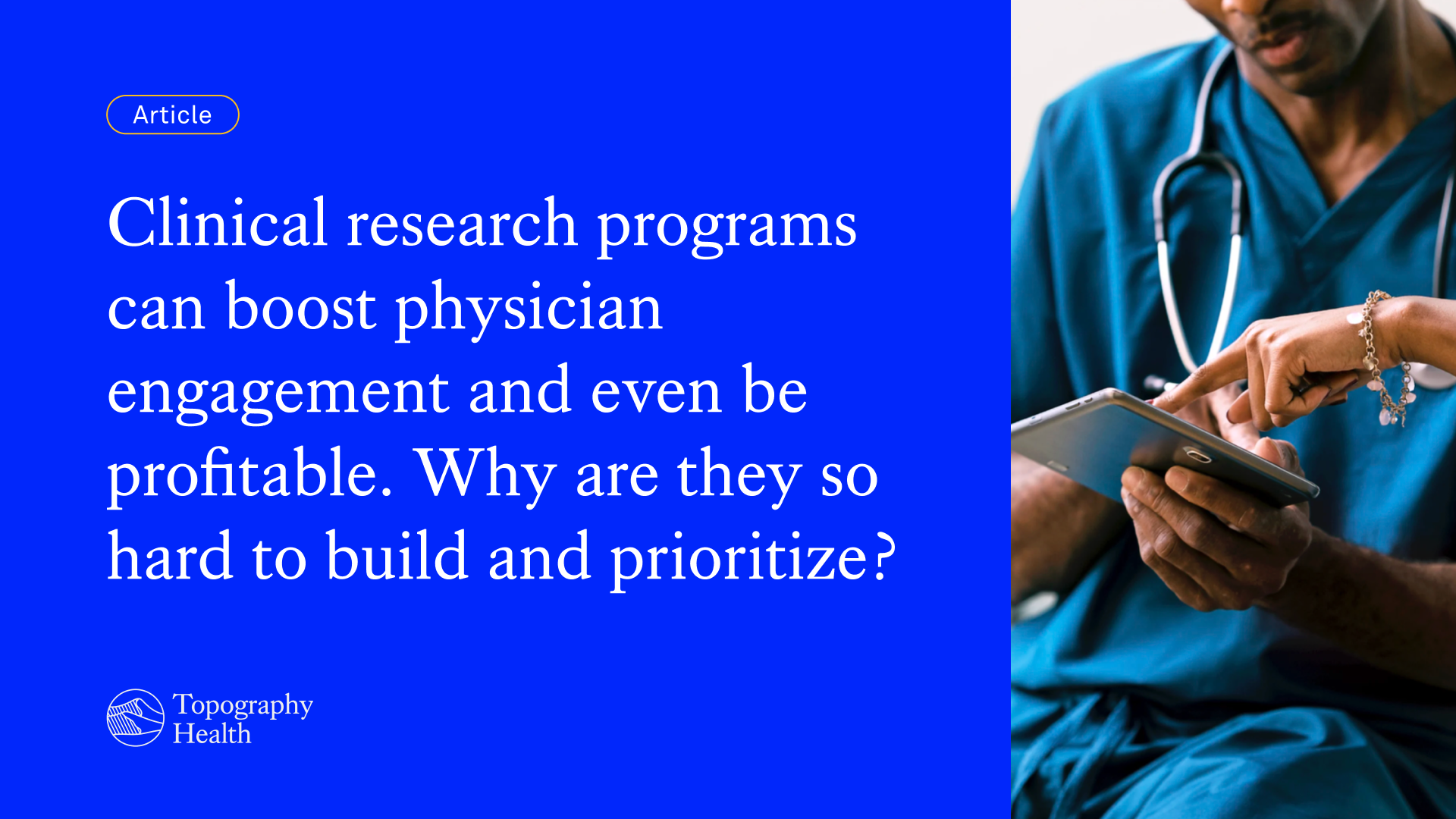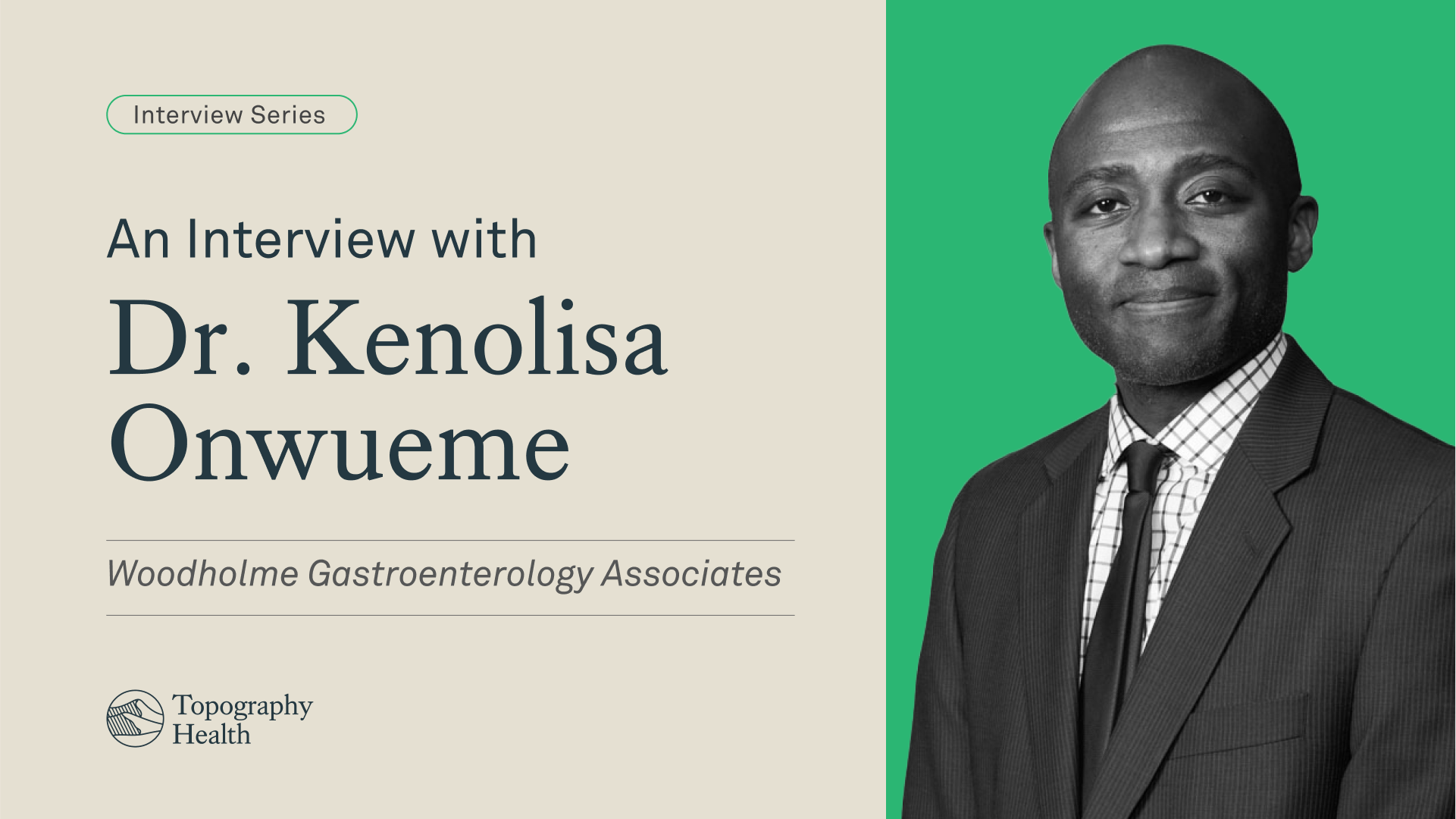Topography Team Q & A: James McMullen
James McMullen, Regional Manager at Topography, plays a key role in overseeing practices across multiple states and leading strategic initiatives. Known for building strong, trust-based relationships with physicians, James ensures that clinical research is both effective and enjoyable for those involved. His focus on clear communication and expectation-setting has contributed to Topography's high investigator retention rate.
James graciously answered a few questions about his current role and responsibilities, his approach to leadership, and what he believes sets Topography Health apart.
James, can you start by giving some background on what led you to Topography?
I went to Tulane University and got a degree in public health, which is where I developed my love for research. While I was in New Orleans, I worked as an entry-level research coordinator at Ochsner Health, a big health system in the area. This gave me a great foundation into understanding what clinical research looked like at a large hospital.
During the pandemic, there were so many departments that needed support, so I began pursuing research within Ochsner’s infectious disease department. COVID was such a terrible time for so many people, but I attribute the pandemic as the starting point of my career. I became a team lead within their vaccine department and developed a love for leading groups towards a common goal.
I moved to Denver and worked briefly for a smaller private practice before joining Topography Health about two years ago. From working at a large hospital in New Orleans, to working at this smaller practice in Denver, I developed a good understanding of how different health systems worked and was able to bring that holistic perspective to Topography.
How have these experiences working in both large and small practices shaped your understanding of the challenges and advantages of different settings?
I would say one of the main differences in coming from a large institution is that you have a completely different relationship, not only with the physicians, but with the patients. At these larger institutions, you often lose the patient connection, and it can be more difficult to recruit successfully for clinical trials. What I’ve noticed while working with these small practices is that because patients have established such a connection with their physicians, they are more willing to participate in trials when their physician recommends it.
Can you explain what exactly a Regional Manager does at Topography? What does your role look like day-to-day?
It’s hard to define what a typical day-to-day looks like…it’s a bit of everything. I spend a lot of time just supporting my teams. I think so much of what makes for being a successful manager is ensuring that your teams feel enabled to carry out the tasks and goals that you’re asking them to. Clinical research is extremely difficult. Every day presents challenges and barriers to success.. I approach each day as a manager thinking about what I can do to enable my teams to be as successful as possible. Today, for example, I’m in the clinic and helping out with hands-on work because they are short-staffed. If there are instances where I can help people take things off their plate, I’m all for it.
We’ve recently had many workflow changes relating to recruitment, regulatory, and data entry, so I also prioritize listening to the team to understand when a new routine is or isn’t working for them. Being a voice for them is one of my favorite parts of my job.
How does Topography help physicians become confident in getting started with research?
When I talk to physicians who have never done research before, I think back to early in my career. These physicians are taking a risk on their end, and I remember how much newness can be scary for them. I like to outline as clearly as possible what the next couple of months will look like and reassure them that I’ll train them on how to do it.
Physicians are incredibly busy people, so it requires a level of patience to communicate with them. Oftentimes it takes more than sending them a PDF of a workflow. Sometimes you have to pull up a chair next to them and reassure them on exactly what they’re going to do.
I tell my team that you should be confident in yourself when you talk to a physician. You don’t have to be an expert in clinical research protocols, but you should deliver clear data points on what makes a patient qualified for their study. When we are confident, they become confident.
Overall, the three key pieces that I prioritize in making an experience enjoyable for research is communicating clearly, setting expectations, and making the physicians feel confident in trusting us.
What does Topography do particularly well that people might not know or appreciate from the outside?
I think our ability to create very close relationships with our investigators makes us successful. We have a very high retention rate, in part because our investigators enjoy what they’re doing. We invest so much energy into ensuring that investigators are not just our business partners, but our actual partners.
Shifting gears a bit, what future trends in clinical research do you see on the horizon?
Utilizing AI has been huge for Topography, so I see that coming up more in the industry. We’re looking at recruiting not only through the typical funnels of referrals and word of mouth but also through a very tailored AI approach. These data pools that we’re creating, with the help of AI technology, of very specific and highly qualified patients, has made our efforts across the board significantly more efficient.
Looking back on your journey with Topography, how would you describe the impact it has had on your career and growth as a leader?
Reflecting on my journey with Topography, I can confidently say it has shaped my career and leadership development. The company provided me with the opportunity to leverage my experience to drive meaningful changes across the clinics and health systems I am involved with. This impact was quickly recognized, leading to my advancement to Regional Manager, where I now oversee operations across multiple states and health systems.
This role has challenged me to grow as a leader, as I manage diverse teams with varying processes, workflows, and personalities. Navigating these complexities has enhanced my adaptability and deepened my understanding of team dynamics. I find it motivating to envision where I might be a year from now, equipped with the knowledge and skills I am continually developing. Overall, my time with Topography has not only been a catalyst for professional growth but has also ignited my passion for leading teams toward success.











